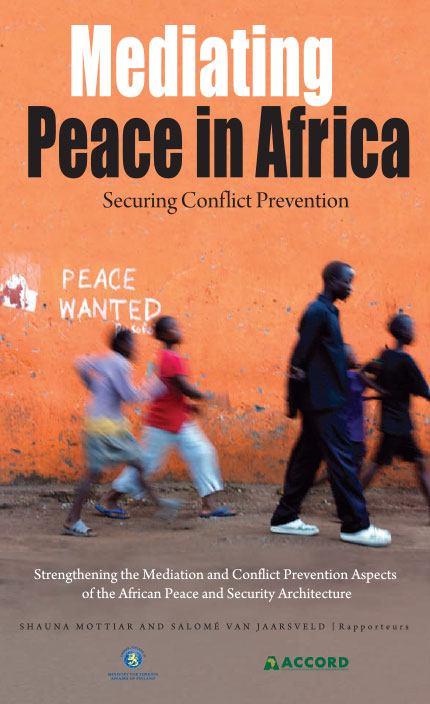
The African Centre for the Constructive Resolution of Disputes (ACCORD), together with the Ministry of Foreign Affairs of Finland held a seminar in Addis Ababa, Ethiopia on 4 March 2009 on the theme of Mediating Peace in Africa: Securing Conflict Prevention. The seminar brought together policymakers, mediation experts and civil society actors to assist the African Union (AU) to strengthen its mediation and conflict prevention mechanisms within the African peace and security architecture.
Africa is entering a new era of conflict resolution and peacebuilding. The formulation of the AU in 2002 and the Peace and Security Council (PSC) in 2004 firmly established institutions dedicated to the promotion of peace, security and stability in Africa. The Protocol Relating to the Establishment of the PSC includes mediation as a specific function of the PSC (AU, 2004: Article 6, 3). Although mediation since the AU and indeed under the Organization of African Unity (OAU) has featured prominently in conflict management on the African continent, specific processes and mechanisms of mediation have not yet been consolidated. Furthermore, the AU has not yet developed a dedicated capacity to manage and support mediation missions in Africa.
As a result of this, the 2008-2010 AU Mediation Work Programme has been initiated and, together with support from African and international donor partners, will provide the AU with support and assistance in the development of capacity to analyse conflict situations, undertake fact finding and good offices initiatives, carry out mediation interventions and support peace processes and post- conflict peacebuilding. The seminar was convened in order to inform the AU Mediation Work Programme, based on four themes:
- Mediating Peace in Africa
- The New Architecture – Lessons and Insights
- Mediation Experiences from the Field
- Mediation Support: Challenges and Opportunities
Five recommendations emerged from the seminar
- That partnerships and cooperation would strengthen the mediation and conflict prevention aspects of the AU’s PSC. Participants agreed that collaboration among a range of African and international actors is critical to strengthen the AU’s role in mediation and conflict prevention in Africa. This is particularly salient given the shifts in Africa’s relationship with international and regional organisations that mark a move away from traditional donor-recipient relationships towards balanced partnerships. To this end, partnerships among African states, the AU, regional economic communities, civil society, the European Union (EU) and the United Nations (UN) are vital in ensuring cooperation, coordination and joint solutions.
- That institutionalising mediation was integral to strengthen the AU’s mediation capacity. This could optimally be achieved by acquiring mediation expertise, where mediation is viewed as a professional discipline that requires institutional support and mediation facilities. This implies a move a way from ad hoc processes and in particular, the development of a viable concept of mediation (much in the same way as a military doctrine is developed).
- That early warning systems should form an integral part of the mediation and conflict resolution process. To this end, a unit within the PSC should be formed to monitor and evaluate the evolving dynamics of a conflict.
- That the AU should establish measures to learn from experiences and record lessons for future best practice. This would ultimately mean building and consolidating institutional memory regarding the AU’s mediation processes.
- That civil society can and should play a key role in mediation processes. Civil society has a vital role in mediation owing to inter alia its ability to provide specialised knowledge, its proximity to issues on the ground and its ability to engage a broad range of stakeholders.

